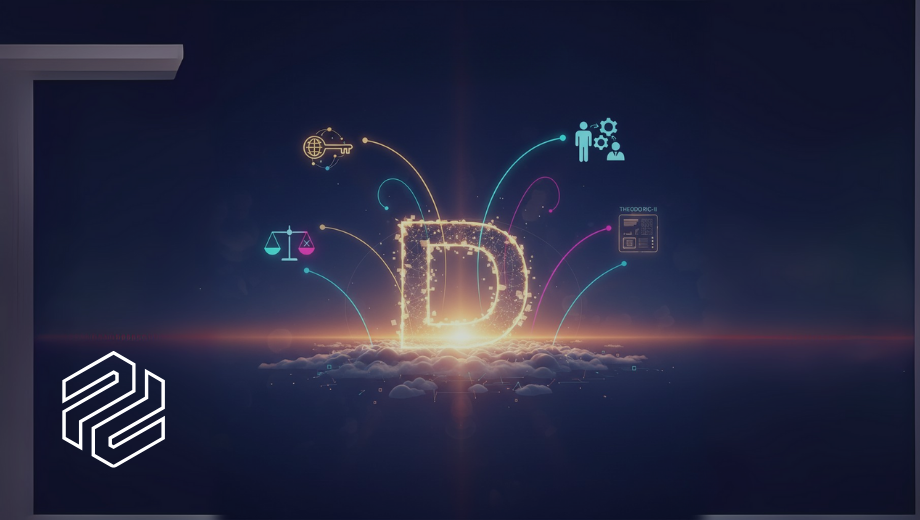Recapping Theodoric-I: Dchain’s first testnet
Please review the introductory article on Dchain for background and context.
Theodoric-I focused on testing the enhanced consensus layer and all the offchain services that were required to test it.
1. Enhanced DPoS: Integrate Self-Sovereign Identity into the consensus layer
With the support of our 13 validator teams, D Foundation (with the support of Gayadeed, a Trust Service Provider) carried out:
1. AI-Driven Legal entity checks: KYB / AML / CTF / AdM
2. Commitment to Information Security Frameworks Compliance: check the status of each validator with respect to compliance with major information security frameworks, such as ISO 27001, GDPR, and DORA, etc.
3. Agreement Automation: ISMS (test) certificates verification, validator information gather (e.g. consensus address)
4. Advanced Electronic Signature (eIDAS2.0): All documents and information were digitally signed by a legal representative of the validating entity. In production, the signatures will have legal validity.
5. Issuance of Verifiable Credentials and the privacy-preserving Verifiable Presentation counterparts: The information gathered and signed by the legal representative are used as part of the issuance Electronic Attestation of Attributes (EAAs) by D Foundation
6. VPs verification integrated in block production: Nodes attached VP in the voting and block proposal processes.
2. Verifiable Credential Revocation and Issuer Public Key rotation
The advantages of verifiable credentials over concepts such as soul bound token or address whitelisting are:
1. Adoption: verifiable credential / Self-Sovereign Identity frameworks are adopted by many jurisdictions / regulators as a method for digital identity and attribute proofing. OpenID4VC and EUDI will onboard millions of users for different use cases, this is the scalable solution with infrastructure already in place to adopt now. For example, EAA issuance are services provided by Qualified Trust Service Providers in the EU.
2. Revocability and Expiration: Similar to PKI, no credential could be forever valid, in the case where credential validity is subject to conditions, it is important to be able to revoke credentials. It is also important to be able to perform key rotation to reduce attack surface and ensure new security standards are adopted.
During Theodoric-I, some validators had their credentials revoked which caused them to be jailed. Furthermore, D Foundation performed a key rotation which required new VPs to be used in consensus. We split the group up such that a large (more than the original quorum percentage) of validators can be jailed and voting power re-calculated using Dchain’s added jailing mechanism, see point 4.
3. Two-Tiers Governance
During Theodoric-I, several proposals were created to test the two-tiers governance system where
1. DT token delegators voted for a proposal to pass, the cooling period was passed and proposal executed
2. Oversight committee created and executed proposal in an expedited manner
4. VP verification accounting
This was not a planned feature, rather it was caused by a chain halt.
A chain halt due to accidentally revoking too many validators and caused insufficient voting power for block production.
A separate accounting mechanism (for VP verification fails) was introduced in addition to the tracker for liveness or double signing. This new mechanism ensures validators have valid VPs when proposing blocks and voting. We allow a threshold of votes without valid VPs in a given window for VP updates etc. If this threshold is over, the protocol will jail and slash the affected validator.
Upcoming Theodoric-II
Building on the learning from Theodoric-I and the offchain services provided by Gayadeed, which was supported by Paradym.id, we are very excited to share some previews of the upcoming testnet - Theodoric-II.
1. Mint and Reward Reduction: We will be testing the new mint module with periodic reward reductions
2. Asset notarisation: We will be joined by a large Qualified Trust Service Provider as the provider for platformD to issue EAAs for electronic invoices
3. End to end execution through of securitisation process: this includes matching engine, asset template management and DT burning
4. Smart accounts: Staking and governance voting will be performed with smart accounts supporting authentication methods such as webauthn
5. Governance: We have upgraded the governance mechanism to ensure opt-in DAO participation and that delegations only apply to block production, not governance voting
Stay tuned for Theodoric-II announcements!


.png)